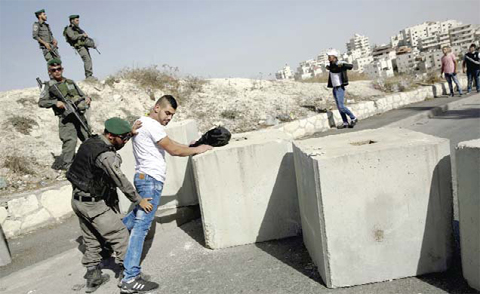 Israeli border police search a Palestinian, next to newly placed concrete blocks in an east Jerusalem neighborhood yesterday. — AP
Israeli border police search a Palestinian, next to newly placed concrete blocks in an east Jerusalem neighborhood yesterday. — AP
JERUSALEM: Israeli security forces deployed massively in Jerusalem yesterday as Jews armed themselves with everything from guns to broomsticks, rattled by a wave of Palestinian attacks that have shaken the country. Some 300 soldiers were reinforcing police, stretched thin by a two-week upsurge in violence that has raised fears that a third Palestinian intifada, or uprising, might erupt.
It was not clear whether the troops were in place yet. The last time soldiers deployed in large numbers was in 2002, during the second intifada, according to a security source.
In addition to the attacks, violent protests have rocked annexed east Jerusalem, the occupied West Bank and the Gaza Strip. Seven Israelis have been killed and dozens wounded. At least 30 Palestinians have also died, including alleged attackers, and hundreds more been wounded in clashes with Israeli forces. In the first two intifadas, in 1987-1993 and 2000-2005, hundreds of people were killed and many more hurt in near daily violence.
Israel's best-selling newspaper, Yediot Aharonot, was full of photos yesterday of Jews arming themselves with even broomsticks and rolling pins, as gun sellers said demand had skyrocketed.
But other stores are suffering, with shoppers staying off the streets. "Business is at 15 percent of normal," said Aron Silverberg, who runs a cellphone shop in central Jerusalem's Mahane Yehuda market. With fear spreading among Jews, police said soldiers on a train near the northern port of Haifa saw someone they considered suspect and began to shout "terrorist".
An officer sitting in the front carriage fired a single shot in the air and someone later pulled the emergency brake. No suspect was found and no one was hurt. "There is really a wave of terror," Defence Minister Moshe Yaalon told army radio. He said "civilians are in the front line, at very short range as a consequence of the fact that the main weapon is the knife, occasionally also firearms."
Stabbings defy security crackdown
On Wednesday, police began setting up checkpoints in parts of east Jerusalem, including the neighborhood that was home to three Palestinians who carried out gun, knife and car-ramming attacks this week. The move followed a decision by Prime Minister Benjamin Netanyahu's security cabinet authorising police to seal off or impose a curfew on parts of Jerusalem.
On one of the city's main thoroughfares, border police were boarding and searching every passing bus.
Shahr Omraq, 51, a cleaner from east Jerusalem, said the unrest has made him and other Palestinians objects of Israeli hostility. "Everyone suspects us," he told AFP. "Racism is growing."
Despite the new security measures, there were two more stabbing incidents in Jerusalem Wednesday. In one, outside the Old City, a 20-year-old Palestinian was shot dead tried when he tried to stab a security guard. In the other, a 23-year-old Palestinian wounded an elderly woman near the crowded central bus station during rush hour before being shot dead by police.
Netanyahu has come under immense pressure to halt the violence, but frustrated Palestinian youths have defied attempts to restore calm. Palestinian president Mahmud Abbas again called Wednesday night for peaceful resistance, but young people fed up with Israel's occupation and the lack of progress in peace efforts have grown tired of his leadership.
The attackers seem to be mostly acting on their own. With no mastermind to pursue, that poses a major challenge to security forces.
While the attacks have fanned Israeli anger and fear, online video footage of security forces shooting dead alleged assailants has fed Palestinian anger, with protesters seeing some of the killings as unjustified. --AFP

